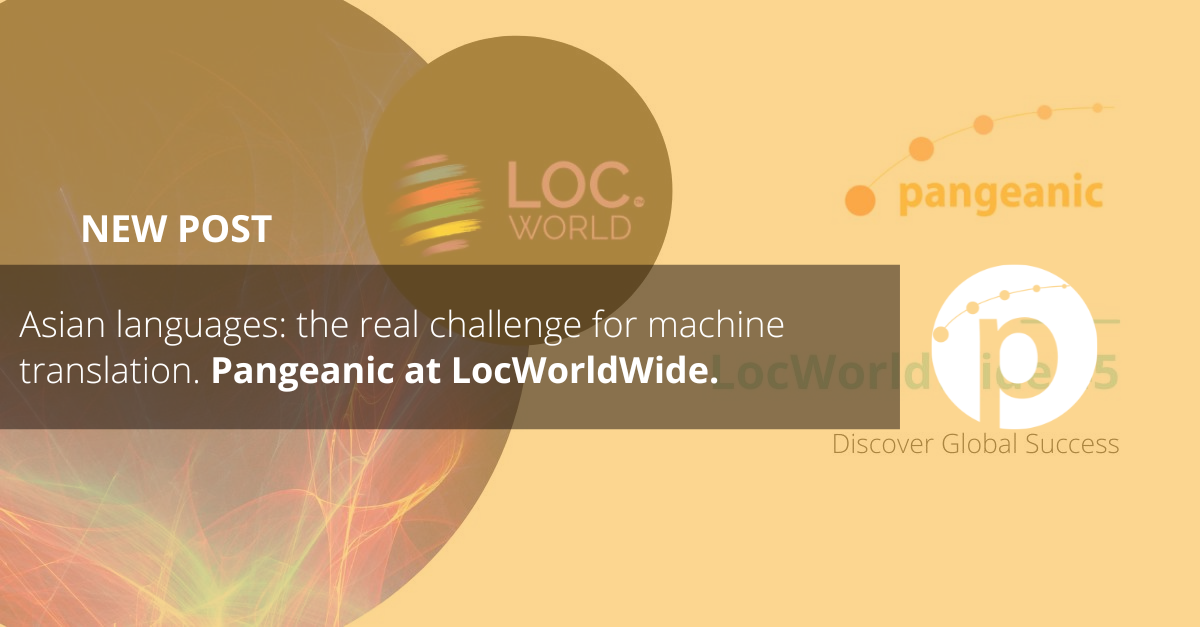
2 min read
09/12/2021
Asian languages: the real challenge for machine translation. Pangeanic at LocWorldWide.
LocWorldWide45 is an event that brings together the world's leading experts in translation and international business.
Imagine a world where the boundaries between languages, cultures, and markets do not exist. Now visualize a place where valuable ideas can be exchanged and materialized in order to build the world you have just imagined. It turns out that such a place exists and is called LocWorld. It is no less than the leading conference on international business, translation, localization, and global website management. Aimed at companies looking to enter new international markets, LocWorld brings together organizations and professionals in a captivating program of dynamic presentations, panel discussions, and networking.
Amando Estela, speaker at "Machine Translation for Asian Languages: Challenges, Solutions and Innovations"
Asian languages present an important challenge for machine translation global initiatives. As Asian markets gain in strength and importance on the international stage, the need to ensure smooth and accurate communication with and between these countries is becoming more and more noticeable. Amando Estela, the veteran expert in digital infrastructures, having worked 15 years with IBM and collaborated with multinationals such as CISCO and CapGemini, was the person who led Pangeanic’s presence in this interesting and complex LocWorldWide45 presentation. With the premise that challenges must be faced with solutions, Amando spoke to us from a point of view full of opportunities and innovations. He put special emphasis on how human participation is necessary for training machines in the complexities of language.
Asian languages, the big challenge for machine translation
The reasons that the Asian market presents significant challenges for the language industry are varied, and not all of them are of the same nature. As a starting point, Asia is a very demanding market, where consumers expect a meticulous result of the highest standard. It is essential to prioritize quality over quantity in translations destined for the Asian market because the great variety of combinations and alphabets increases the number of algorithms needed to construct a sentence correctly. In addition, the lack of bilingual data available in these languages is a major constraint for machine translation when collecting and interpreting examples. For these reasons, for example, translating from English to Simplified Chinese would be much easier for machine translation software than translating from Vietnamese to Simplified Chinese.
Keep learning:
What is the difference between Traditional Chinese and Simplified Chinese?
The difficulty of translating Japanese
The Japanese language is considered one of the more difficult languages to translate, in part because of its wide variation in structure and complex grammar. There are no less than three different Japanese alphabets and a wide variety of dialects. During the conference, we learned that, as with other Asian languages, no matter how close the dialects are, the user expects highly specific translations. It is therefore necessary to analyze all text and all syntax, as well as constantly readjust the tool to achieve a natural result. Japanese also uses characters and kanji instead of words, so it is especially necessary to translate concepts and not only independent terms. Therefore, it is interesting to note that it would be much easier to translate a text from Japanese to Korean than from Korean to Japanese.
Read more:
Are Japanese, French and Spanish foreign languages for artificial intelligence?
Pangeanic in Japan
Pangeanic's new delegation in Japan is a formidable added value for those clients who require Japanese translation services. Through the absorption of Business Interactive Japan, Pangeanic is making its way into the machine translation market in Japan with one of the most renowned translation companies in the country. This important step is a way for Pangeanic to get closer to the impeccable quality of European translations in Asian markets, relying on native human talent, innovative technology, and a culture renowned for its high standards.
Pangeanic’s Eco
At Pangeanic, the text is not translated, it is transformed. With the help of neural technology, Pangeanic’s ECO platform offers deep adaptive machine translation services, closing the gap between machine translation and human parity. With deep adaptive tools, users can now customize MT (machine translation) models to suit individual needs. Designed to deliver secure, high-quality translations, ECO facilitates fast and agile content management while constantly evolving and absorbing all the value it will bring us in the future.



